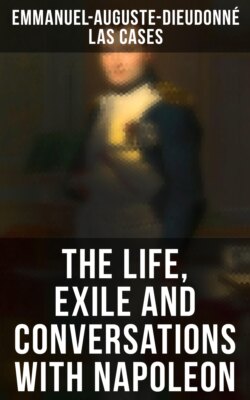Читать книгу The Life, Exile and Conversations with Napoleon - Emmanuel-Auguste-Dieudonné Las Cases - Страница 75
На сайте Литреса книга снята с продажи.
THE EMPEROR FREQUENTLY WOUNDED IN HIS CAMPAIGNS.—COSSACKS.—JERUSALEM
DELIVERED.
ОглавлениеTable of Contents
25th.—The Emperor, who had not been well the preceding evening, was still indisposed this morning, and sent word that it would be impossible for him to receive the officers of the 53rd, as he had appointed. He sent for me about the middle of the day, and we again perused some chapters of the Campaign of Italy. I compared that which treats of the battle of Arcole to a book of the Iliad.
Some time before the dinner-hour, he assembled us all around him in his chamber. A servant entered to announce that dinner was ready; he sent us away, but, as I was going out last, he called me back. “Stay here,” said he, “we will dine together. Let the young people go; we old folks will keep one another company.” He then determined to dress, intending, as he said, to go into the drawing-room after dinner.
While he was dressing, he put his hand on his left thigh, where there was a deep scar. He called my attention to it by laying his finger in it; and, finding that I did not understand what it was, he told me that it was the mark of a bayonet wound by which he had nearly lost his limb, at the siege of Toulon. Marchand, who was dressing him, here took the liberty of remarking that the circumstance was well known on board the Northumberland; that one of the crew had told him, on going on board, that it was an Englishman who first wounded our Emperor.
The Emperor, on this, observed that people had in general wondered and talked a great deal of the singular good fortune which had preserved him, as it were, invulnerable in so many battles. “They were mistaken,” added he; “the only reason was that I always made a secret of all my dangers.” He then related that he had had three horses killed under him at the siege of Toulon; several others killed and wounded in his campaigns of Italy; and three or four at the siege of St. Jean-d’Acre. He added that he had been wounded several times; that, at the battle of Ratisbon, a ball had struck his heel; and at the battle of Esling, or Wagram, I cannot say which, another had torn his boot and stocking, and grazed the skin of his left leg. In 1814, he lost a horse and his hat at Arcis-sur-Aube, or in its neighbourhood. After the battle of Brienne, as he was returning to head-quarters in the evening, in a melancholy and pensive mood, he was suddenly attacked by some Cossacks, who had passed over into the rear of the army. He thrust one of them off with his hand, and was obliged to draw his sword in his own defence; several of the Cossacks were killed at his side. “But what renders this circumstance very extraordinary,” said he, “is, that it took place near a tree which at that moment caught my eye, and which I recognized as the very one under which, when I was but twelve years old, I used to sit during play-hours and read Jerusalem Delivered.” ... Doubtless on that spot Napoleon had been first fired by the love of glory!
The Emperor repeated that he had been very frequently exposed to danger in his different battles, but it was carefully kept secret. He had enjoined once for all, the most absolute silence on all circumstances of that nature. He said that it would be impossible to calculate the confusion and disorder which might have resulted from the slightest report or the smallest doubt relative to his existence. On his life depended the fate of a great Empire, and the whole policy and destinies of Europe. He added that this habit of keeping circumstances of that kind secret had prevented him from relating them in his campaigns; and indeed he had now almost forgotten them. It was only, he said, by mere accident, and in the course of conversation, that they could recur to him.
